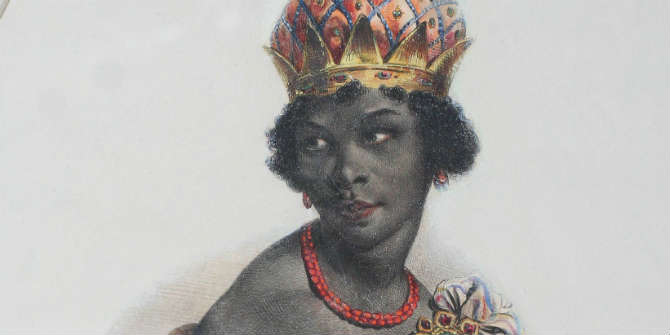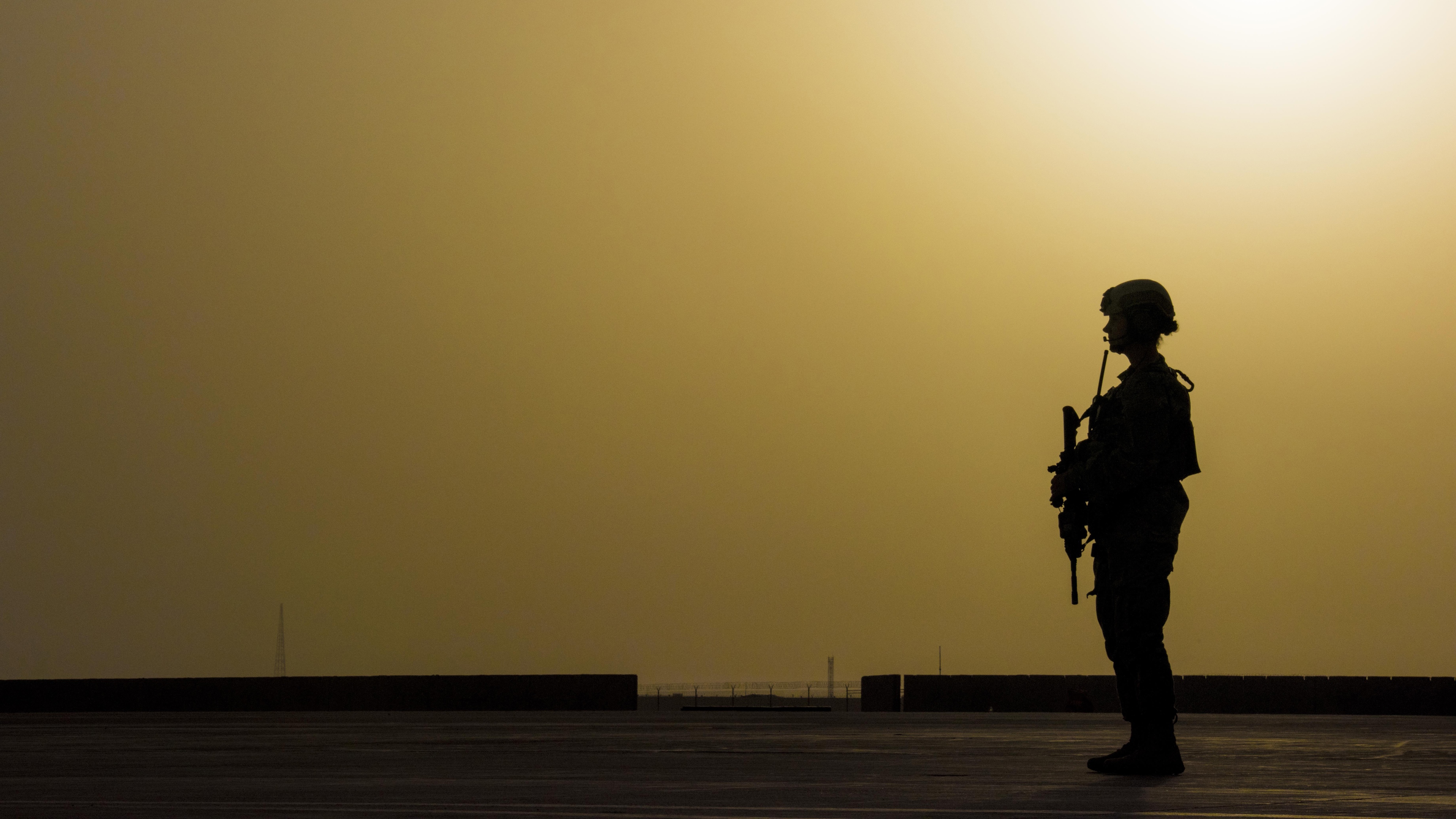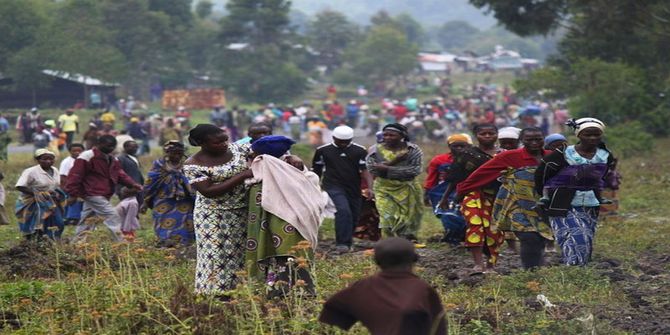With the proliferation of literature on the Lord’s Resistance Army, it is difficult for researchers to reveal more than is already known. To be original the author need not resort to cultural relativism, and ‘moral outrage’ can exist alongside the humanity of combatants.

In the early 2000s, the central north of Uganda was the site of one of Africa’s most protracted armed conflicts. Joseph Kony’s Lord’s Resistance Army (LRA) had been fighting the government of Yoweri Museveni since the late 1980s. Thousands of people had been forcibly recruited, many of them children. Hundreds of thousands of people were living in internal displacement camps in dreadful conditions.
In November 2003, the situation was described by the UN Under-Secretary-General for Humanitarian Affairs as a ‘moral outrage’. The LRA was subsequently referred to the International Criminal Court, and the region became a focus of increased aid agency and media attention, including in sensational YouTube documentaries by the organisation Invisible Children. Currently, Joseph Kony remains at large, but northern Uganda itself is no longer a war zone.
In this context, there has been a remarkable outpouring of writings, most of it concerning the Acholi people, who have been most affected by the violence, and who have comprised most of the LRA combatants. The literature includes anthropological studies which address just about every aspect of the war and its aftermath, thereby presenting both an opportunity and a dilemma for those researching the conflict more recently.
On the one hand, there are texts to critique. On the other, the proliferation of publications raises doubts that new ones can add to what is already known.
Sam Dubal began his research in the area in 2012, several years after the end of the fighting. His response to the existing literature has been to cite it in bits, but mostly to use it selectively as a peg or a straw man target. It makes his well-written, engaging and provocative book exasperating.
A good example comes at the start. In a journalistic style, he describes meeting a woman preparing a meal and braiding her child’s hair. He expects her to be an agentless epitome of feminine victimhood, abused to the point of becoming an animal in need of ‘re-humanization’. To his amazement, she identifies herself as a former LRA captain, who supports LRA tactics and the LRA way of life. She is positively disposed towards the man she was given to, even though she knows that if he ever returns from the LRA he will live with another of his LRA wives. Perhaps Dubal is being disingenuous here for literary effect, because his surprise is unlikely.
Publications listed in his bibliography discuss the fact that women in the LRA could secure a rank, could be senior, and could have affection for their LRA husbands. A separate reception centre location had to be established for such women and their children when they initially returned from the LRA, because they were asserting authority over other women who returned with them, and who had very different perceptions about what they had experienced.
It is also strange that, in his discussion of the relations between former LRA women and men, Dubal does not engage with Erin Baines’s book, even though it deals with matters of complex victimhood in ways that overlap with his interpretations. Even more surprisingly, Holly Porter’s much praised study of Acholi sexuality and violence is omitted from his references. In fact, none of Porter’s publications are mentioned, and Okot p’Bitek’s seminal article on Acholi love is absent too.
To be fair, Dubal openly indicates that he is not intending to engage systematically with the work of other researchers, and presumably he recognises there is nothing much that is new in his accounts, whether of particular events or attitudes among those returning from the LRA. It is his analysis that he considers insightful. Bizarrely, an important aspect of this is only presented in the Acholi language.
Dubal addresses the passage to former LRA rebels he has come to know. It reads as follows:
‘… very many people are using your names as people who have returned from the bush. They are getting money using your names or telling lies using your names. I hope that you will think I am using your names rightly, that the things that I say to the people in this world with this book will teach them, change their thinking, will make leaders find different ways in this life – ways of knowledge, ways of truth … I did not stay in the bush and I don’t have a gun. But I am a soldier, a soldier of truth and knowledge …’
It is commendable that Dubal makes his loyalties explicit, although it would be good to know why he thinks his particular group of former LRA contacts is broadly representative. From my own research, I would assess that they can share the views of individuals who embraced the LRA way of life, secured a military rank, and find life since returning home boring. They are not, however, the majority. Thousands have not returned because they were killed. Others remain deeply troubled by what was done to them or they were forced to do.
In presenting the perspectives of his chosen informants, Dubal explains that he wants to dislodge master narratives of humanity. His key point is that all narratives about humanity are moral narratives, and that these are used to make the LRA and Joseph Kony inhuman.
The first part of this contention is broadly correct, but the second fails to follow in the literal way he implies. He cites an interview from 2006, in which Kony claimed lots of questionable things, including that Museveni says he is an animal – or more specifically, that the LRA are like lions that eat people. But it seems very unlikely Kony really thinks the Ugandan President believes he is not a person. Even Kony surely appreciates that the issue is whether he has acted in a manner that is acceptable, precisely because he is human. Dubal surely knows this too but, here again, he is setting up an easy target.
Human beings imbue being human with moral values, which affects the ways in which humanity is perceived and understood. Those moral notions result in some peculiar contradictions, because actions that evoke moral values tend to be assessed by motivation, rather than effect. Thus, humanitarianism is an ideological concept that embraces policies from ostensibly neutral emergency aid, to military deployments purporting to prevent acts assessed as heinous crimes by those doing the intervening. A great deal has been written on such matters, including the ways in which internationalised notions of humanity are overly grounded in European conceptions.
Dubal largely sets these debates aside, however, rejects the concept of humanity altogether, and criticises other analysts for not taking a similar position, tending to misinterpret their meaning in the process. When Heike Behrend refers to the LRA accelerating processes of dehumanisation, she is obviously not meaning that they actually became non-human.
Similarly, when the LRA commanders are cited for ‘crimes against humanity’ in International Criminal Court warrants, it does not mean that they have behaved as animals. On the contrary, the term was introduced as a crime at the Nuremberg Tribunals to prosecute Nazis for acts they perpetrated as human individuals who made choices. It signified that they could not excuse their actions by claiming that they behaved in a herd, with no will of their own. It was used by the prosecution team, and in the Nuremburg Judgement, because it more precisely allocated accountability for actions than the term ‘genocide’ – which was viewed as having too collective a quality, implying that atrocities occurred as a kind of mass action.
Use of the term ‘crimes against humanity’ thus allocates human status to LRA commanders. It inherently rejects the view that they were unable to act humanely. In other words, it does the precise opposite of what Dubal supposes.
Drawing attention to the way ‘crimes against humanity’ was adopted at Nuremberg is relevant to what troubles me most about Dubal’s arguments. Abandoning conceptions of humanity takes him into disturbing territory. He explains that he was motivated to write a more sympathetic view of the LRA when Invisible Children produced a video that compared Joseph Kony to Osama bin Laden and Hitler. Invisible Children’s propaganda was often misinformed and misleading (although I have a photo of an LRA combatant posing in the bush, proudly wearing a bin Laden t-shirt). Associating Kony with Hitler may be overblown, but it does raise the question of whether Dubal would apply his views to Nazis too.
Dubal offers us immersive cultural relativism. He describes ways in which his LRA friends thought about their lives in the bush and shows that they are normal men and women. Other scholars and journalists researching in the region have found the same and have written about social life and norms among the LRA, but Dubal takes this line of thinking further than I would.
All those I have met who survived time in the LRA are manifestly imbued with humanity, including commanders and combat veterans. It is also common for them to discuss and contrast codes of behaviour regulating their existence in the bush (lum) with those regulating existence back home (gang).
Nonetheless, ‘moral outrage’ still strikes me as an appropriate term for acts in the region such as the sexual violation of a girl on a pile of corpses, the cutting off of lips, forcing children to kill their own relatives and throwing babies into bonfires. After reading this book, I’m left with the underlying conundrum: why do ordinary people do, or condone, unspeakable things?
Sam Dubal, Against Humanity: Lessons from the Lord’s Resistance Army (University of California Press, 2018).
Tim Allen is the Director of the Firoz Lalji Centre for Africa and a Professor of Development Anthropology. He was first witness for the prosecution in the ongoing trial of LRA commander Dominic Ongwen at the International Criminal Court in The Hague.
The views expressed in this post are those of the author and in no way reflect those of the Africa at LSE blog, the Firoz Lalji Centre for Africa or the London School of Economics and Political Science.





